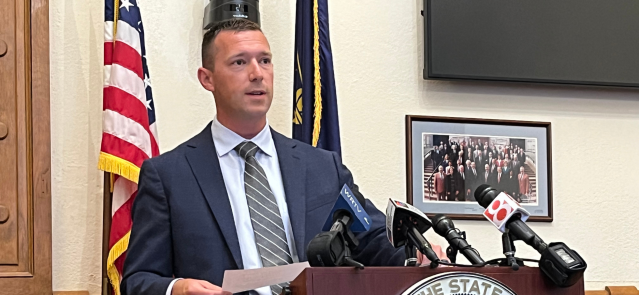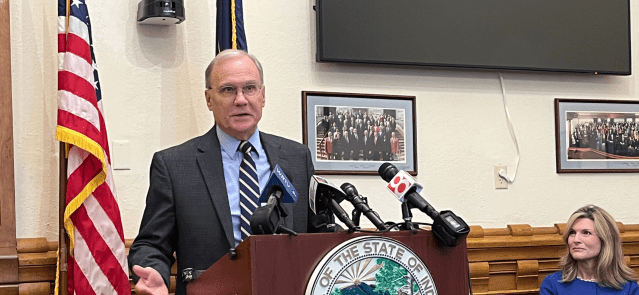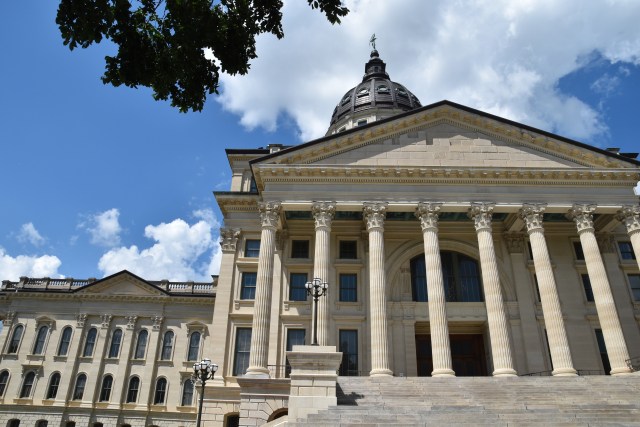Stay ahead of the curve as a political insider with deep policy analysis, daily briefings and policy-shaping tools.
Request a DemoMayes, Mitchell fight over who gets to issue execution warrant
State officials look to more data, new forecast to determine Medicaid’s budget impact
State officials on Tuesday said they were waiting for fiscal year-end data and a new Medicaid forecast to ascertain how the program’s ballooning expenditures will affect the state’s bottom line.
State Comptroller Elise Nieshalla, Office of Management and Budget Director Cris Johnston and Acting State Budget Director Joseph Habig held a news conference Tuesday highlighting Indiana’s fiscal year-end data. Yet they gave few updates regarding the state’s Medicaid program because officials were still awaiting June’s Medicaid financial data.
State officials in December reported a nearly $1 billion forecasting error. At the time, state lawmakers pledged to cover the unexpected shortfall with an additional $713.1 million over the biennium from the state surplus and $271.2 million out of a Medicaid reserve account. (Tuesday’s fiscal year data reflected the same dollar amounts.)
That month, officials predicted the state’s Medicaid funding shortfall to be $255.2 million for the fiscal year. Through May, the latest month data was available, the projection had increased to $392.9 million, the Indiana Family and Social Services Administration reported, cautioning that some of the increase stemmed from assessment fee collection timing. Yet-to-be-released June data will determine whether the state’s $255.2 million estimate was too high or low.
State officials in December estimated the shortfall for fiscal year 2025 to be $457.9 million. Johnston, however, said that estimate could change with a new Medicaid forecast later this year.
“This December’s forecast — they will take into consideration some of the actions that FSSA [Indiana Family and Social Services Administration] has taken and factor that into their forecast,” Johnston said. “So I’d imagine that $457 million is going to be a different number come later this year.”
Since last December, the Indiana Family and Social Services Administration has implemented changes to what it says was the main cause of the increased Medicaid costs — what used to be the state’s Aged and Disabled Waiver. (The waiver has since become two separate waivers: the Health and Wellness Waiver, for Hoosiers aged 59 and younger, and the PathWays for Aging Waiver, for Hoosiers aged 60 and older.)
Specifically, attendant care expenditures under the now-severed waiver were driving the increases, according to the administration. In commentary released with its May Medicaid financial report, the administration reported that attendant care expenditures for the fiscal year have exceeded the December 2023 forecast by $42.8 million and the budget by $503 million.
According to the administration’s May Medicaid financial report, the state’s fiscal year-to-date Medicaid expenditures were more than $62 million, after adjustments, above what the December forecast predicted. And through May, Medicaid expenditures for nearly 2 million Hoosiers outpaced what lawmakers had budgeted for by $384 million, after adjustments.
The administration has moved to corral attendant care expenditures by no longer allowing spouses, biological parents and guardians of minors — whom the state dubs “legally responsible individuals” — to provide attendant care. Earlier this year, the agency allowed them to transition to the state’s Structured Family Caregiving program, which often pays less under a capped per diem structure. The switch and other changes are estimated to save the state about $300 million over the biennium, the administration says.
State officials on Tuesday said Indiana was sitting on a nearly $2.6 billion surplus. But some remained cautious about the news, including Sen. Ryan Mishler, R-Mishawaka, who said in a statement the state’s Medicaid spending “is not sustainable and could adversely affect other aspects of our state’s budget.”
Even after the state’s “unwinding” efforts — which have seen more than 400,000 Hoosiers disenrolled from Medicaid since April 2023 (about a quarter of whom have re-enrolled, according to the administration) — Indiana’s Medicaid spending for the 2024 fiscal year through May was up by nearly $2 billion compared to the prior fiscal year at the same time.
Further highlighting the increased costs to the state, no reversions were made from the Office of Medicaid Policy and Planning in the 2024 fiscal year. More than $526 million in reversions were made during the 2023 fiscal year.
Contact Jarred Meeks on X @jarredsmeeks or email him at [email protected].
Correction: This article has been updated to reflect Cris Johnston’s correct job title.
USPS audit shows deficiencies in KC metro operations
A recent United States Postal Service audit revealed that the Kansas City metro’s delivery operations are inefficient, including at two Kansas locations.
The postal service’s Office of Inspector General performed audits at the Kansas City Processing and Distribution Center and delivery units in Mission; Kansas City, Kansas; and Kansas City, Missouri, during the week of May 13.
Kansas’ offices — Robert L. Roberts Station (Kansas City) and Shawnee Mission Post Office (Mission) — had deficiencies in all five areas of review: delayed mail, package scanning, arrow keys, carrier timekeeping and property conditions, according to the audit.
Auditors said they selected the locations because of concerns raised by U.S. Sens. Roger Marshall, R-Kan., and Josh Hawley, R-Mo.
The audit reaffirmed the persistent mail delivery problems, Marshall said in a news release Monday. He said Kansans deserve “consistent and reliable” services.
“I hope the USPS will take these findings and implement real solutions to these problems. Until this is addressed, our team will continue to sound the alarm,” Marshall said. “We know the problems now, we need solutions.”
The distribution center in Kansas City, Missouri, had 103,273 outbound trips from April 1, 2023, through March 31, 2024.
About 53.7% of those trips were late (28,026), canceled (24,782) or extra (2,665).
Management at the Kansas post offices said the delays from the distribution center affected the offices’ operations, resulting in late mail delivery on their end.
The audit also found that the post offices didn’t properly manage their arrow keys used to open various mailbox types, which auditors said increases the risk of mail theft.
At the Kansas City office, auditors said 12 of the 47 keys at the unit weren’t on the list and eight of the 43 keys couldn’t be located.
At the Mission office, auditors said nine of the 50 keys were not on the list and seven of the 48 keys on the list could not be located.
Post office administrators for the Kansas City metro agreed with the audit’s findings.
Marshall said a second report, with details on solutions to address the issues, would come in mid-September.
Bryan Richardson is the managing editor at State Affairs Pro Kansas/Hawver’s Capitol Report. Reach him at [email protected] or on X @RichInNews.
Indiana budget future cloudy with slow tax growth, Medicaid cost jump
Slow growth in tax collections over the past year and a big jump in Medicaid expenses took a bite out of Indiana’s state government surplus.
Indiana’s fiscal year report released Tuesday showed the state ended June 30 with $2.55 billion in cash reserves — a figure down by $375 million, or 13%, from a year ago.
The overall surplus is expected to shrink by about $200 million more in the coming year.
That could make it difficult for the Legislature to give significant funding increases to schools and other programs when a new two-year state budget is debated in 2025 with a new governor in office.
State Office of Management and Budget Director Cris Johnston said he believed prudent budgeting by the Legislature has left the state with sufficient surpluses.
“These reserves, which are still at the 10% to 12% range, I think, give us the confidence that we’ll still be able to deliver on services,” said Johnston, who is Gov. Eric Holcomb’s top fiscal adviser. “We’ve been waiting for this severe recession for the last couple of years and it hasn’t really happened. So we’ll see what happens. People are looking a lot at interest rates and consumer spending. I’m confident going into the next budget session and I think we’ve got all the tools set up to continue that fiscal discipline.”
Possible warning signs ahead
The three main sources of state revenue — sales, individual income and corporate income taxes — grew less than 1% from the previous year and came in about 3% less than the projections that legislators used in drafting the current state budget in 2023.
Continue reading “Indiana budget future cloudy with slow tax growth, Medicaid cost jump”Statehouse Briefs: Flags at half-staff to honor late Speaker Barkis
Flags at state facilities will be lowered to half-staff to honor late Speaker Marvin Barkis, Gov. Laura Kelly ordered Tuesday.
Kelly ordered the flags lowered from now until sundown the day Barkis is buried. The former representative’s obituary does not include a funeral date, but a celebration of life is scheduled for Oct. 11 in Paola.
Barkis died July 19 at the age of 81. He served in the Kansas House of Representatives from 1978 until 1993.
During the last two years of his tenure, Barkis led the chamber as Kansas’ last Democratic speaker of the House. He was one of only three members of his party to hold the position.
In a statement, the governor offered her condolences to Barkis’ family and praised his work on school and family issues.
“His contributions to our state will not be forgotten,” Kelly said.
$1.3M in art grants announced
Nearly $1.3 million in Kansas Arts Commission grants was awarded Tuesday to 108 recipients in 42 counties.
Lt. Gov. David Toland, who also serves as secretary of commerce, announced the awards Tuesday.
“It is important for the state to engage, connect and support the abundant creativity that can be found throughout Kansas,” he said in a news release.
Funding for the art grants comes from the Legislature and the National Endowment for the Arts. According to the release, the money will support art projects including museums, murals, music and more.
The 108 grants came in four categories:
- Arts Everywhere: Programs, exhibitions and other arts and cultural projects
- General Operating Support: Funding an arts organization’s budget
- Visiting Artists: Bringing professional artists to Kansas audiences
- Public Art and Murals: Public installations that highlight local communities
As of 2022, arts and cultural production made up 2.2% of the state’s gross domestic product, according to the U.S. Bureau of Economic Analysis. The industry contributes more than 41,000 jobs.
Brett Stover is a Statehouse reporter at State Affairs Pro Kansas/Hawver’s Capitol Report. Reach him at [email protected] or on X @BrettStoverKS.
Tennessee government ‘citizen-facing’ systems back to near normal after national meltdown
Tennessee Department of Finance and Administration officials say nearly all of the state’s “citizen-facing” systems are up and running following last weekend’s national meltdown caused by a defective software update sent by global cybersecurity leader CloudStrike to Microsoft’s Windows operating system.
“At this point, we can confirm that 99% of our citizen-facing systems were up by the end of the weekend,” department spokeswoman Gina Long said.
Finance Commissioner Jim Bryson said CrowdStrike had a “major impact” on the state along with companies across the country.
“We worked all through the weekend to get our servers and our individual workstations up,” Bryson said as he left a State Building Commission subcommittee meeting with state Treasurer David Lillard and Comptroller Jason Mumpower on Monday.
“We’re making a lot of progress on it. We still have a lot to do,” he said. “But we’re working on it very hard and we have a lot of people dedicated to it.”
Bryson also said CloudStrike and Microsoft have worked with the state to “help us develop ways to get people up faster.” It’s been a “very manual process,” he added.
Tennessee Department of Safety and Homeland Security spokesman Wes Moster said Driver Services Centers had “sporadic” impacts. By Monday all centers were operating normally, he said.
Treasurer Lillard quipped that “it hasn’t affected our operations except to the extent we’ve had some screens show the ‘blue screen of death.’” But he said his IT team worked through everything with the help of F&A’s Strategic Technology Solutions office. Lillard described it as a “minor irritation the other day, but that’s all.”
“Not a disaster,” the treasurer added.
“And we haven’t gotten anybody stuck in other cities that can’t get home that I know of,” Lillard said, alluding to fellow Republicans who were hit by the outage as they sought to leave Sunday from the Republican National Convention. “We’re fortunate, just lucky is what we are.”
U.S. Rep. Chuck Fleischmann, R-Ooltewah, was said to have shelled out $2,900 for cab fare to ferry himself and others from Milwaukee back to Southeast Tennessee.
Delta, American, United and Allegiant airlines were affected by the glitch. Southwest Airlines was not.
Mumpower said his office uses different software, so the meltdown didn’t affect his staffers.
“We for audit purposes have for years been on a different system than other state agencies,” he said.
But the comptroller is not exactly lording over other agencies’ woes.
“It’ll be us with the way this stuff goes,” he said. “Just not this time.”
Indiana DNC delegation endorses Harris
Indiana’s Democratic National Convention delegation on Monday unanimously voted to endorse Vice President Kamala Harris’ presidential candidacy, the state party said.
Indiana’s 88 delegates, originally pledged to President Joe Biden, are unbound to any specific candidate after he announced Sunday he was leaving the race.
Their endorsement comes as Democrats across the country have moved to support Harris in the last two days.
After receiving Biden’s endorsement, Harris, the presumed front-runner for the party’s nomination, has since collected endorsements from other prominent party members, including U.S. Secretary of Transportation Pete Buttigieg, Michigan Gov. Gretchen Whitmer and California Gov. Gavin Newsom.
The Associated Press reported Monday that Harris has secured enough delegates’ support to win her party’s nomination.
The delegation supported Harris “so that she can continue the legacy of unprecedented job growth, historically low unemployment, and fighting for reproductive freedom in all 50 states,” Indiana Democratic Party Chair Mike Schmuhl said in a news release.
The party also announced Monday that former U.S. Sen. Joe Donnelly will serve as the state’s delegation chair at the convention, which is scheduled for Aug. 19-22 in Chicago.
Contact Jarred Meeks on X @jarredsmeeks or email him at [email protected].
Kamala Harris’ presidential bid reinvigorates Georgia Democrats
Georgia Democrats have gained new momentum heading into the November election, propelled by President Joe Biden’s decision to bow out of his reelection bid and hand the reins to Vice President Kamala Harris.
The historic decision, announced Sunday, is expected to prove pivotal in the national and state political arenas and breathe new life and purpose into statewide elections in Georgia, political observers and legislators said.
By Monday afternoon, the Georgia Senate Democrats publicly endorsed Harris on X. She also received endorsements from over half the national Democratic delegates she needs to secure her party’s nomination.
Harris has visited Georgia at least four times this year stumping for Biden, urging Georgians to “get the word out” about the White House economic agenda and get out “into the streets.”
“This shakes it up,” University of Georgia political science professor Charles Bullock told State Affairs about Harris’ entry into the presidential race.
Josh McKoon, chairman of the Georgia Republican Party, said Harris has a “very similar campaign” to Biden’s.
“Obviously she owns the record that has been compiled [by the Biden administration] over the last three and a half years,” McKoon told State Affairs. “I don’t see much of a difference, other than I’m sure we’ll be having an honest conversation about her record of putting young Black men in prison for nonviolent drug offenses as a prosecutor in California, and contrasting that with President Trump’s championing the First Step Act to give people shorter sentences so they can rebuild their lives and be fully rehabilitated and become productive members of society. Other than that, I don’t see a really big change in terms of what the issues are that we’ll be talking about and how we’ll be going about turning out our voters.”
Continue reading ” Kamala Harris’ presidential bid reinvigorates Georgia Democrats”





